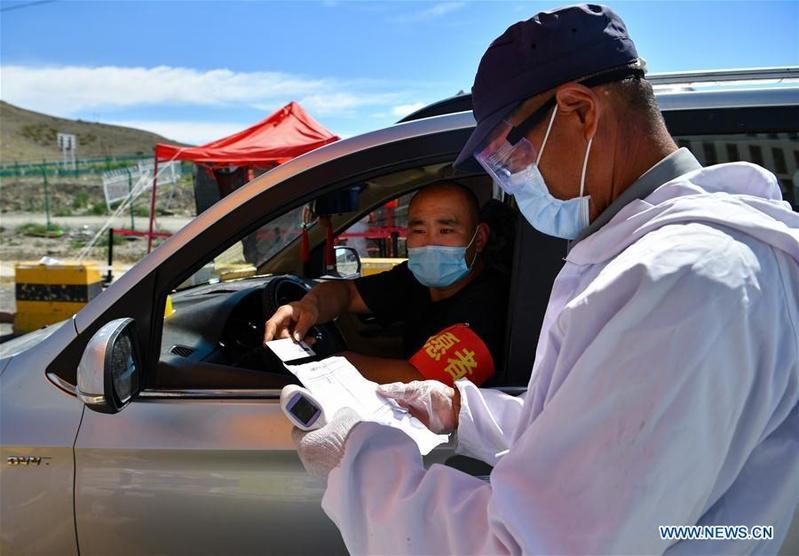 A worker in protective gear checks the information of a man entering the Xinjiang Jiuding farm produce wholesale market at the entrance of the market in Urumqi, northwest China's Xinjiang Uygur autonomous region, July 29, 2020. (SONG YANHUA / XINHUA)
A worker in protective gear checks the information of a man entering the Xinjiang Jiuding farm produce wholesale market at the entrance of the market in Urumqi, northwest China's Xinjiang Uygur autonomous region, July 29, 2020. (SONG YANHUA / XINHUA)
BEIJING/URUMQI - Chinese health authorities said Monday that it received reports of 43 newly confirmed COVID-19 cases on the Chinese mainland Sunday, including seven imported cases and 36 locally transmitted ones.
Among the new local cases, 28 of them were reported in the Xinjiang Uygur autonomous region while the remaining eight cases were seen in Liaoning province, the National Health Commission said in its daily report.
Among the new local cases, 28 of them were reported in Xinjiang while the remaining eight cases were seen in Liaoning, the National Health Commission said
All the new cases in Xinjiang were reported in the regional capital Urumqi, the local health authorities said.
ALSO READ: Mass testing a go-to response to clusters
Three of the seven new imported cases were reported in Jiangsu province, two in Shandong province, and one case each was reported in Liaoning and Guangdong province, respectively.
No deaths related to the disease were reported Sunday, the commission said, adding that three new suspected cases, all imported, were reported in Shanghai.
Another 10 patients were discharged from hospitals after recovery, the commission said, adding that there were 781 patients still being treated, including 35 in severe condition.
As of Sunday, a total of 84,428 confirmed cases have been reported on the mainland and 4,634 have died.
Altogether, 79,013 patients have been cured and discharged from hospitals by Sunday, according to the commission.
So far, 2,092 imported cases have been reported on the mainland. Out of those cases, 1,997 have been discharged from hospitals after recovery while 95 remained hospitalized, with two in severe condition, the commission said.
No deaths had been reported from the imported cases.
There were still four suspected COVID-19 cases, the commission said.
According to the commission, 560 close contacts were released from medical observation Sunday, and there were 21,585 close contacts still under medical observation.
By Sunday, Xinjiang has reported 590 confirmed cases and there were 14,939 people still under medical observation
Eleven new asymptomatic cases, including three from outside the mainland, were reported. Eight of the new cases were reported in Xinjiang, according to the local health authorities.
The commission said that six asymptomatic cases were re-categorized as confirmed ones, while 257 asymptomatic cases, including 102 from outside of the mainland, were still under medical observation.
By Sunday, Xinjiang has reported 590 confirmed cases and 116 asymptomatic cases. There were 14,939 people still under medical observation, the local health authorities said.
From July 15 to Sunday, Urumqi has seen a total of 30 people discharged from hospitals after recovery, and another 26 asymptomatic cases released from medical observation.
READ MORE: Urumqi outbreak expected to slow down
As of Sunday, 3,511 confirmed cases, including 35 deaths, have been reported in the Hong Kong Special Administrative Region (SAR), 46 confirmed cases in the Macao SAR, and 474, including seven deaths in Taiwan.
A total of 1,959 COVID-19 patients in the Hong Kong SAR, 46 in the Macao SAR and 441 in Taiwan have been discharged from hospitals after recovery.
Urumqi reopens farmers' markets
All farmers' markets in Urumqi have reopened with intensified COVID-19 prevention and control measures, local authorities said Monday.
Personnel entering the markets, including staff members, vendors, traders and drivers, are required to carry proof of negative nucleic acid test results and undergo body temperature screening. In addition, they must register their information and vehicles must be disinfected before entering the markets.
Daily visits will be capped and nucleic acid tests will be conducted once a week for all staff and vendors.
In addition, authorities at the markets will step up nucleic acid sampling and inspection of imported food, especially meat, aquatic products, fruits and vegetables.
READ MORE: New COVID-19 cases falling in Xinjiang


